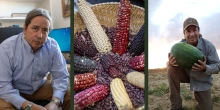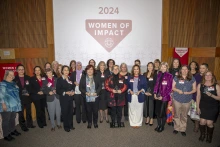Awards
Announcing 2021 HSI Seed Grant Awardees
Research, Innovation and Impact (RII) and the Office of the Provost are excited to announce the recipients of the Hispanic Serving Institution (HSI) Faculty Seed Grant Program.
The requests for proposals opened to all University of Arizona faculty in March 2021. Forty-three proposals were received and were reviewed by 18 faculty members from across the institution. Seven proposals were awarded funding for AY 2021-2022. Congratulations to the award recipients! Read more about the funded projects below.
Overview:
In just three years, the University of Arizona went from being federally designated as a Hispanic Serving Institution in 2018, to being one of only nine institutions to be awarded the inaugural Seal of Excelencia in 2019, a national certification for institutions that strive to go beyond enrollment to intentionally serve Latinx/a/o students, and was named Outstanding Member Institution by the Hispanic Association of Colleges and Universities in 2020. Coupled with these distinctions, the UA is committed to examining within as we aim to further advance these efforts across faculty scholarship and creative work.
The HSI Faculty Seed Grant Program is offered through Faculty Affairs and HSI Initiatives with funding from Research, Innovation, and Impact (RII). The goal of the fund is to support scholarly research and creative work among early-career faculty which enriches the UA’s designation as an HSI, and advances scholarship that directly impacts Latinx/a/o and BIPOC (Black, Indigenous, and People of Color) students and communities, and advances UA’s Purpose and Values around integrity, compassion, exploration, adaptation, inclusion, and determination.
Projects:
Applicant(s)
Jeremy Garcia, Associate Professor; Teaching, Learning & Sociocultural Studies, College of Education, Thomas E. Sheridan, Professor, Anthropology, College of Social & Behavioral Sciences
In Partnership with
Stewart Koyiyumptewa, Director
Hopi Cultural Preservation Office (HCPO)
Abstract
As a land-grant institution built on Tohono O’odham’s ancestral lands, this project exemplifies pathways for the UArizona to partner with Native Nations and Indigenous educators to engage in truth-telling histories in education. This critical Indigenous qualitative research project is to analyze the process of developing curriculum that privileges Hopi perspectives on the history of Hopi and Spanish colonialism. The significance of this project honors the goals of the Hopi Cultural Preservation Office for Hopi youth to develop a critical Indigenous consciousness of their history through curriculum and pedagogy. Often, the inclusion of Indigenous perspectives on the history of colonization is glossed over or simply omitted from the educational textbooks and learning opportunities in schools. The impact of this work contributes directly to: (1) the first Hopi and Spanish History K-12 curriculum; (2) opportunities for Hopi educators to enact self-determination and intellectual sovereignty; and (3) research and scholarship that contributes to critical Indigenous curriculum studies. Additional outcomes contribute to the HSI goals to include diverse perspectives, scholarship, and service that builds capacity for others to be in solidarity with Indigenous communities by understanding the dehumanizing impacts that Spanish colonialism had on Indigenous peoples across the southwest region in which UArizona resides.
Applicant(s)
Mauricio Ibañez-Mejia, Assistant Professor, Geosciences, College of Science; Albert Barberán, Assistant Professor, Environmental Science, College of Agriculture & Life Sciences; Carmen King de Ramírez, Associate Professor, Spanish & Portuguese, College of Humanities
Abstract
We propose to develop a pilot program that uses Spanish language, along with the landscapes, ecosystems and culture of the Southwest, as vehicles to enhance the diversity and inclusion of Hispanics in STEM. We will develop an 8-week long afterschool program for TUSD juniors and seniors, consisting of a series of engaging teaching modules focusing on the geological, ecological and cultural history of the Southwest. Each of these in-classroom modules, spanning two weeks in duration, will culminate with an outdoor experience to cement knowledge and to develop a sense of connection with nature. The last two weeks of the program will be devoted to student-led capstone projects supervised by the PIs. Activities will be conducted in person and in Spanish at a high school chosen in consultation with our TUSD partners. In order to enhance access to the materials and to reach a wider student population, our activities will be documented and made available on-line through a website we will develop. The central objective of this project is to provide Hispanic students with the confidence and sense of belonging needed for pursuing careers in Science, convincing them it is possible to be successful in STEM having English as second language.
Applicant(s)
Sung Eun Jung, Assistant Professor of Practice, Teaching, Learning & Sociocultural Studies, College of Education
Abstract
The proposed project aims to 1) implement a literacy-rich robotics education program for Latinx children (aged 5 to 8) in collaboration with the John Valenzuela Youth Center in South Tucson and 2) conduct scholarly research about Latinx children’s funds of knowledge in STEM learning and culturally responsive STEM pedagogy for early childhood teachers. As a strength-based approach, this project values Latinx students’ cultural, social, and linguistic backgrounds as unique assets and resources in designing and implementing the robotics curriculum. This project will directly impact Latinx English-language learners (ELLs) from low-SES families in South Tucson by ensuring their early entry into STEM through interactive robotics practices. This project will invite UA undergraduate students in the early childhood education program to serve as tutors. This project will train preservice early childhood teachers in culturally relevant STEM teaching. At the theoretical level, this project will broaden our understanding of funds of knowledge that young children bring into STEM learning and suggest implications for culturally responsive STEM pedagogy in the field of early childhood education.
Applicant(s)
Aminata Kilungo, Assistant Professor of Practice, Community, Environment & Policy, Mel & Enid Zuckerman College of Public Health, Mónica Ramírez-Andreotta, Associate Professor, Environmental Science, College of Agriculture & Life Sciences
Abstract
This seed grant proposal aims to improve our understanding of potential exposures to Helicobacter pylori (H. pylori), a carcinogenic microorganism associated with gastric cancer, and arsenic, associated with diabetes and obesity, to reduce health disparities in the Arizona-Mexico border communities. The specific objectives of this work are to; 1) Identify potential environmental sources of H. pylori and arsenic in surface and private well water sources that vulnerable populations are reliant upon in the Arizona-Sonora Border region; 2) improve our understanding of the prevalence of these environmental sources and prevalence of distal gastric cancer, diabetes and obesity in Arizona; and 3) share all information collected with participating families to increase environmental health literacy. Outcomes of this project will; 1) inform science, policymakers, and the community on needed interventions to improve water quality; 2) reduce risks associated with the development of gastric cancer, diabetes, and obesity; and 3) build community resilience by improving environmental health literacy so the communities can better advocate for their health.
Applicant(s)
Jenny J Lee, Professor, Educational Policy Studies & Practice, College of Education; Jameson David (JD) Lopez, Assistant Professor, Educational Policy Studies & Practice, College of Education; Santiago Castiello Gutiérrez, Postdoctoral Research Associate, Educational Policy Studies & Practice, College of Education; Amanda Cheromiah, Director, Native SOAR
In Partnership with
Native SOAR
Universidad ITESO in Guadalajara, Jalisco
Consortium for North American Higher Education Collaboration (CONAHEC)
Abstract
This internationally collaborative action-research project seeks to expand the University of Arizona’s (UA) Hispanic Service Institution (HSI) status across the US-México border and recenter its knowledge and outreach by connecting Indigenous communities internationally. US higher education has long suppressed Indigenous communities’ systems of knowledge, which are grounded in interconnected relationships with their ancestral territories, other living entities, and the world around them (Deloria & Wildcat, 2001; Dozier Enos, 2017; Nelson & Youngbull, 2015). Creating a community of interest where Indigenous educators and thought leaders from different regions can share their knowledge provides a unique opportunity for courageous innovation as well as further supporting culturally relevant practices acquired over millennia. Therefore, this project looks to bring together two institutions that are attempting to address historic wrongs that have marginalized Indigenous students from their community. An especially unique feature of this work will be to incorporate digital technology as both a medium for storytelling and increasing awareness towards positive change.
Applicant(s)
Shefali Milczarek-Desai, Assistant Clinical Professor of Law & Director, Workers' Rights Clinic, James E. Rogers College of Law; Tara Sklar, Professor of Health Law & Director, Health Law & Policy Program, James. E. Rogers College of Law
Abstract
The twin pandemics of 2020 – COVID-19 and racial injustice – have exacerbated the inequities experienced by BIPOC workers. Women working as long-term care aides, who overwhelmingly are immigrants, Latinx, and/or BIPOC, disproportionally have been affected by hazardous working conditions serving to increase their existing vulnerabilities. The long-term care direct care workforce is predominately composed of these women, yet their perspectives are missing in the legal literature and national conversation surrounding essential workers’ rights, such as paid sick leave and workplace safety.
Applicant(s)
Bo Sun, Research Assistant Professor, Pharmacology & Toxicology, College of Pharmacy
Abstract
The incidence and death rates of colorectal cancer (CRC) are the highest in African Americans and Alaska Natives comparing to other racial groups, and they are less likely to receive early diagnosis of CRC and high-quality care. Current surgery, chemo- and radiotherapy have caused serious adverse side effects in CRC patients, and many of them also failed to respond to immune checkpoint inhibitors (ICIs) therapy. Therefore, I propose to improve the medical care of Black and Indigenous communities suffering CRC by providing an innovative cancer vaccine. The objective of my research is to develop nanoparticle-based vaccines to simultaneously deliver tumor antigens and dual immune adjuvants for immunotherapy of CRC. We will test whether the proposed vaccine loaded with CRC-derived antigens can inhibit the tumor growth more effectively in preclinical CRC model, comparing to the mix of soluble tumor antigens and adjuvants. The proposed bi-adjuvant nanovaccines are expected to have high efficacy and complement current immunotherapy since the majority of CRC patients do not respond to ICI alone. I believe that the outcomes of this project will advance biomedical research that is beneficial for BIPOC communities and enrich UA’s designation as an HSI.



